SH: Can you tell me about any rescue/wildlife/enforcement stories that stick out in your memory?
John: Well I told you about some of the highlights in my enforcement stuff.
SH: Yes, those were good, they were my first enforcement stories. Were you ever undercover?
John: We did some fishing stuff in Jasper. I remember one day, this was when I was a seasonal warden, I was doing some fish checks at Talbot Lake. That was about the only lake that we allowed ice fishing on. And so, I was just doing the PR (Public Relations) business and whatnot, and this fisherman complained to me about some guys that were illegally fishing. They were catching more than their limit and they were using illegal bait and there were a number of things. He was really upset so I made arrangements to meet him. I think he was staying at Tekarra Lodge. So I met him that night at Tekarra Lodge because he was really upset about what was going on, and it turned out he was a judge from Edmonton, a magistrate from Edmonton. So he wanted to lay a formal complaint. I took all of his information, and the next few days Ivan Phillips and myself went undercover. We posed as fishermen and kind of crept a little closer to our suspects, and sure enough we caught them with too many fish and illegal bait and I can’t remember what else, all the details, and they were charged accordingly. I got back to the reporting person, this judge, and I made his day. It was kind of good fun.
And we did a lot at Bow Lake too. We knew there was a lot of illegal activity at Bow Lake, and it was primarily lake trout that they were preying on. So, every July 1st when the season opened up, we really ended up getting some pretty good charges with too many fish and whatnot, and on the most part a lot of it was plain clothes and then we’d get a uniform warden to grab the guy that we were dealing with. So, it was a joint operation. A number of people would get involved with those things and they were always good fun.
Twice I got burned by people, going up to do a check. I learned never to check a fisherman who has a cigarette in their hand because I’ve had two people touch their line with their cigarette when I’ve gone to check on them. One guy was this Italian, an older guy from Banff and he was so upset. He had too many fish and touched his line, because they’re all using smelts, and I was able to retrieve his line with a stick. And then I had another guy at Wapta Lake doing the same thing to me. I never got the bait there.
SH: Wow that’s interesting. So I’m confused, were you an armed warden or were you just before that in law enforcement? John: No this was well before the arming.
SH: So do you want to tell more stories, or do you want to talk about how the Warden Service changed?
John: It was difficult because I was doing the big Burgess Shale investigation when all this was going on. I never took sides on it; I upset people on both sides. But, I basically stayed neutral on it. I would have been happy to carry a sidearm, but I saw where it was going, and I did not want to be part of it. I still had a number of years left, I had over five years left. It was unfortunate that it had to drag on so long because I took down some of the work I was doing for the Burgess Shale. It was turned over to the RCMP and I tried to get RCMP involved and nothing happened, so it wasn’t all Parks Canada’s fault, when I did talk about the Burgess shale. It was this whole changeover and some things got lost. And it was unfortunate, but you could see it coming. The type of people that we were hiring, they weren’t enforcement type people. When I first started the program if they were going to arm us, it could have been done back then, but the people that they were hiring before I retired, a lot of them didn’t want to even mention the word enforcement. They didn’t see that as part of their job and things evolve, things change. That was a part of it too, the people that we were starting to hire. (Tape 09:27)
SH: Do you want to talk about any other changes in your career?
John: There were so many changes after 20-25 years doing something one way and seeing a bunch of changes, it’s hard. This arming was just one component, really when it comes down to it. Everything became a lot more specialized and a lot of it, rightly so. We had to because things were changing, and a lot of it was good. But it was difficult for someone like me that was a generalist, that was involved with public safety and enforcement and wildlife. I did everything, and I did everything efficiently. It was pretty cool back then because you were involved with everything, but you did become an expert at something. I guess as time went on and the way things fell into my lap, I became the law enforcement guy for the field unit. I could have become a backcountry guy just as easily, but things just happened to go that way. So there were a lot of good things and there were a lot of things that were left, that were lost.
Communication is so important in our business and when we don’t communicate amongst each other, let alone some public, so much is lost for sure. It makes things difficult. So, I just put my head down and I decided I did not want to get involved in the new law enforcement program. There were a number of reasons. I didn’t want to have to reapply on my job. I was told there was going to be no position in our field unit for someone like me. So, I wasn’t going to cow tow to anybody after the years I did, and I ended up just taking on some environmental monitoring roles and continued with a little bit of wildlife stuff, before I finished my career, and a little bit of backcountry.
SH: Yes, I kind of lost track of you towards the end of your career.
John: I kind of just stuck my head down. I knew I had a few years left, I had some outside interests from outside of Parks Canada and at one point in time we were told, because I was the Law Enforcement Specialist, I might even be red circled and might lose my job, so I developed a lot of outside interests, and I had some outside work. One was being a guide outfitter in Mount Assiniboine Park which probably upset a few people, but I was protecting myself and my family for a lot of things. So, I went through some tough times and it was hard to finish your career that way, but that was just the way things went.
SH: What about the Warden Service was important to you? – Idea of protecting and preserving national parks, keeping people safe etc.
John: There was such great team work and camaraderie, that’s what I really liked, with the warden job and we were so independent, and that’s what got us into a lot of trouble. We were able to educate a lot of people, not only the public, but also management, and that got us into some trouble too. We knew the National Parks Act and Regulations and other legislation better than anybody else, so we had to remind other managers of other functions, about regulations and rules and whatnot, that tended to be forgotten. That actually made for some pretty hard feelings sometimes, but I think in the grand scheme of things, it was a pretty important role for us too. Yes, the being part of a team was so cool. Whether it was a major rescue, or law enforcement or some big resource project.
SH: Did you fight fires at all?
John: I wasn’t big on fire. I took Initial Attack Party Leader course out at Hinton, but I wasn’t a big fire guy you know. I just kind of stayed on the perimeter and if they needed an extra guy I got involved. But that’s a good example for sure.
SH: Were you ever part of some of the big wildlife incidents in Lake Louise? (Tape 15:06)
John: Yes, I was involved in a number of different maulings and whatnot. Not a lot in number but probably one of the biggest ones was just outside the park on the Albert River in the mid 90s. We got a report of a couple of missing hunters through the local RCMP in Radium. The Banff guys got called in, myself included, and it turned into be a multi-day search for these hunters. There was a number of different groups involved: outfitters, private people and the RCMP and I forget what they call the local search and rescue.
SH: BC PEP (British Columbia Provincial Emergency Program)?
John: Yes, PEP was involved. Because of our rescue capabilities we became the primary search and rescue agency. It’s unfortunate that we did find both hunters and they were severely mauled to death. I could go on about what happened but basically, they were goat hunting. One guy was from Invermere but he had moved away. He had a young wife and camper down the road. These two guys hunted only for a couple of years together. They got goat draws, so they decided to go for a goat together. They jumped on their mountain bikes, because there was a road closure up the road, and they were going after goats. However, as they were climbing the mountain they came across a great big bull elk, which they had a tag for. So, they shot the elk, and this is just below treeline. They’re at about 8000 feet where they shot this elk. They had the elk quartered up and it looked like they were going to head down and they were severely mauled and after the report came in it snowed over a meter of snow up there. So the first couple of fly by’s we saw bears in the area, and a couple of bags, you know some human evidence and whatnot. So, what looked like could have been a human form under the snow. So, I forget who went in … could have been Gord Peyto. We had both Gord Peyto and Scott Ward with their dogs on standby. There was myself, Reg Bunyan, Marc Ledwidge and I’m probably missing one more person. But we found the one body right away. It was funny, we ended up killing the bears, they wouldn’t leave.
SH: Was it more than one bear?
John: It was a small sow and two cubs. We retrieved the body, that was partly eaten by the bears, and we tried to get as much evidence … we found one gun right away. It was unloaded and the other one took a while to find but it was unloaded too. So, what happened was these hunters were blindsided by a bear or bears, and trying to get their guns loaded, and they weren’t loaded. And the one guy we finally found him after two days of searching. He was only about two hundred yards down the hill but there was so much snow and it was so hard traveling that we would do these grid searches. We had the dogs and we were set up as two groups of two. And we’d get partway down the mountain and we’d call for the helicopter to sling us back up to the starting point and go down another spot. I think finally it was Reg Bunyan that found some blood and we followed this blood spot and it got us to the second victim.
SH: So she chased them both.
John: One guy, he was just bit. The other guy that we found second, he had bite marks on every part of his body it seemed like. They were pretty messed up. So, they were flown out to the hospital and that was kind of the end of us because the (B.C. Provincial) CO service was involved. Unfortunately, they didn’t keep their clothes or take good bite measurements on their bodies, because there was speculation that another bear did the damage. There were a couple of bear experts that got involved after. One is Gary Shelton, who wrote quite a good story on it (in one of his books). It’s called “Bear Attacks; The Deadly Truth”. I think it’s in his second book. He interviewed me and Reg Bunyan, and one of the CO’s and a couple of other people that were working at it, and of course the family. I ended up going back to the scene with Reg, the following summer with the Coroner from Golden. We flew in and collected a bunch more evidence. There was knives and a few other things. One of the family members wanted to put a plaque in place. So, we did collect a number of other articles; clothing and a few other things. We didn’t find any bear hair, but in any event, I had another rescue on my hands because the Coroner couldn’t keep up. He wasn’t in near the shape of the other guys, so I had to call in the helicopter and do a sling rescue and have him pulled out. The other guys left me behind. The deal was we were going to hike back down the mountain but I just slung off with this guy, Tim. He was a really nice guy.
But getting back to the story, there’s a chance, and it makes sense to me, like why a bear would take off if there was another bear. It could have been a different bear, like a big boar. They were yearling cubs I believe and why a mother would take on that and charge these guys down. We could tell it was instant. This bear just attacked them, the bear came over the hill and attacked them, and killed them. And the bear hardly fed on the carcass of the elk itself. They were hanging out there for two days and they fed a tiny bit on the elk, and it was the cubs. And any exposed skin, like the guy’s head where he was actually chewed up. They were bedded down closer to the guy that was killed than the elk. Unfortunately, we didn’t get the whole story because there was a lot of evidence that was lost and our job up there was to actually find the people, remove them and there was probably too many agencies involved. I know if we were involved with them we would have, if something like that happened it the park, we would have completely investigated it; picked up a lot more evidence and protected the evidence. And for whatever reason it wasn’t. It was taken to the hospital and they incinerated their clothes right away, and I’m not sure what happened.
SH: Yes, and the fact that the other guy was down the hill, one bear must have chased him.
John: Well one bear did the damage, both their guns were unloaded. (End tape 24:32)
Part 3 – 2:51 pm
SH: Are there any legends or stories associated with the Warden Service that you can share? Is there anyone from the Service that stands out in your mind?
John: I’m going to give you more details about the bighorn poaching. I had moved down to Kootenay Crossing in early summer, so I had all summer there. It was fall, October 20th, and I was just gearing up, and was going to head to the (Ya Ha Tinda) Ranch with Randy Chisholm. We were going to trail the horses back. I got a frantic call on the radio about a poaching in progress right in the town of Radium, adjacent to Red Streak Campground. I went roaring down there and got up to the scene. I knew exactly where the scene was taking place. I called a couple of other wardens, whoever else was available, and I remember Doug Wilkinson was one that showed up, and police from the local detachment, there was a corporal, a member. They didn’t get on scene right away. There was a witness and they pointed up to the campground and said, “There’s a guy up in the campground with a gun”. There was already a guy inside the park with a dead sheep. Things happened really fast. There was a guy just below the campground with a dead sheep, and I believe the RCMP member actually was there and had him apprehended. I was told there was another guy in the campground, further up. So, I go screaming up to the campground, through swing sets and this is October 20th and the campground was closed, thank goodness. I don’t think they had any sites or loops open. I come across this guy carrying a gun and there’s a ram nearby. And I said, “Stop, you’re inside the national park and you’re under an arrest for hunting in a national park.” And he turns around, and his eyes, I remember his eyes, they were in a big haze, not a haze but just were wide open and really excited. And then he was saying, “I shot a sheep and I’ve got to finish killing it, it’s still alive.” And I said, “No, put your gun down now.” I took his gun and I took hold of him and Doug showed up a little later and here we had this wounded sheep and I knew it was mortally wounded, and I told Doug we are going to have to keep this sheep under surveillance. So, we had a warden follow this sheep around and I took this guy back down. It was really nice to have the detachment in town because we were able to take these guys to the detachment. We collected some evidence, as much as we could. A lot of it didn’t happen til later because we caught these guys red handed. Both sheep were shot inside the park.
SH: Did that sheep die?
John: Yes, it died a couple of hours later but it took a while. They were under an arrest. We put them in detention inside the detachment and we protected the scene as much as we could. Collected casings and whatever else you do at the crime scene. We actually contacted ID (Identification Unit) from Cranbrook RCMP and they came up and we got a helicopter and flew over, and took over pictures. Part of it was a boundary issue. The Park boundary runs through, runs between just above the campground and in the townsite there’s private property right on the boundary there. There’s boundary signs and it was slashed out and there is a boundary there but there’s private property. The townsite’s right there. And back then there was no regulation saying you can’t hunt or discharge a firearm in the village of Radium, believe it or not. So, we had them, and one guy gave me a really good statement and he’s the guy that we convicted. The other guy ended up not saying a word and hired the best lawyer in Cranbrook. I collected all this information, went to the Prosecutor from Kimberley and he suggested we go indictable. I was a little worried because I know their defense was not knowing where the boundary was. As it turned out, the one guy that got off, we couldn’t prove complete …. I don’t know if the terminology is right as I’ve been out of the program for so long …. prove due diligence beyond a reasonable doubt that he actually knew.
It pays to get a really good lawyer and it was hard to believe that he got off. If we could have gone Summary (Conviction) we would have nailed him completely. So, there was a few things that caught us and it was a huge big learning thing for me, and I don’t think I had the smartest Prosecutor in the world to be honest with you, but I thought we made it go as best we could. I don’t know why, but I never got a lot of help out of the wildlife branch, out of Calgary at the time. I ended up taking this whole thing on myself and it was a huge, huge stressful deal that went on and on and on. It went on for a whole year, and took over my life and a good part of my job for so long. It was incredible. I learned a lot from it and so did a lot of other people. And the village did make it illegal to discharge a firearm. Unfortunately, people used crossbows after that, I should say bows, bow and arrows. And they finally changed it to no hunting period. The growing pains of a small town. (Tape 07:38)
That was something else for sure, that was huge.
SH: That’s an interesting story. How much did the one guy get as a fine?
John: I believe $10,000.00 and lost his firearm. I think it was a $10,000.00 fine. So it was pretty big back then considering if it would have happened in the Province it would have been a $2000.00 fine. It was $10,000.00 or jail time, I can’t remember, and he didn’t have a lot of money, so he could have done a little bit of jail time. I can’t remember the specifics.
John: Yes, I had some other big cases. At Wapta, when the ski hill owned Wapta Lodge and they had a huge, huge fuel leak and they initially tried to cover it up. I forget how we got wind of it, but it was pretty significant. It was a huge deal. We got other agencies involved but usually charges aren’t laid. It’s a matter of doing all the remedial work, which was done. They trucked out piles and piles of dirt, contaminated soils I should say, so it worked out pretty good. We ended up doing a pretty good clean up. That was a pretty big project. I remember when Hal Morrison was down in Field, CP (Canadian Pacific) was charged partly because they weren’t following up on all the cleanup. You should talk to Hal if you are looking for law enforcement stories because that’s a really good important one, and it was one of the first. Right in the townsite of Field, they use to change oil and just dump it on the ground. They had these big, giant pits where there was so much contaminant and it all started leaking into the Kicking Horse River. So, testing proved it was coming from CP Land, and ultimately, they were charged, not under the National Parks Act but under some other Federal legislation. And I came in on the tail end of that, and it was a really, really big case and Hal did some really good work on it. He’s probably the guy that should talk about that.
SH: We’ll look at that list at the end and see if he’s been done yet (Tape 10:38)
What made the Warden Service such a unique organization? We already talked about that. So, do you have any lasting memories as a Warden? Favorite park, cabin, horse, trail, humourous stories. Do you have another story you’d like to tell?
John: Well like I said, I should have given it some thought. But I’m so busy on my own place and I’ve got like, I keep busy and I’ve got all kinds of things going on in my life. The Warden Service is totally behind me, Parks Canada is totally behind me, and I’ve put that away, like it’s gone. I maintain some really good friendships. But that’s as far as it goes. I don’t say I don’t want to get involved with the Warden Alumni, they do really, really good work. But I can’t see ever being a director or an active board member. I love the social thing about it and that’s the most important thing for me, is that component. If I can keep in touch with that part of it and tell the odd story, but it’s the friendships that’s the most important for me now. I still really enjoy getting out with Parks. I try to, like some of the other people, tried to do some mentorship or volunteering primarily to use warden cabins because that was such an awesome opportunity, to be out in the wilderness and use the warden cabins. I think we have such good experience and so much of that experience and way of living has gone down the wayside. It’s really sad.
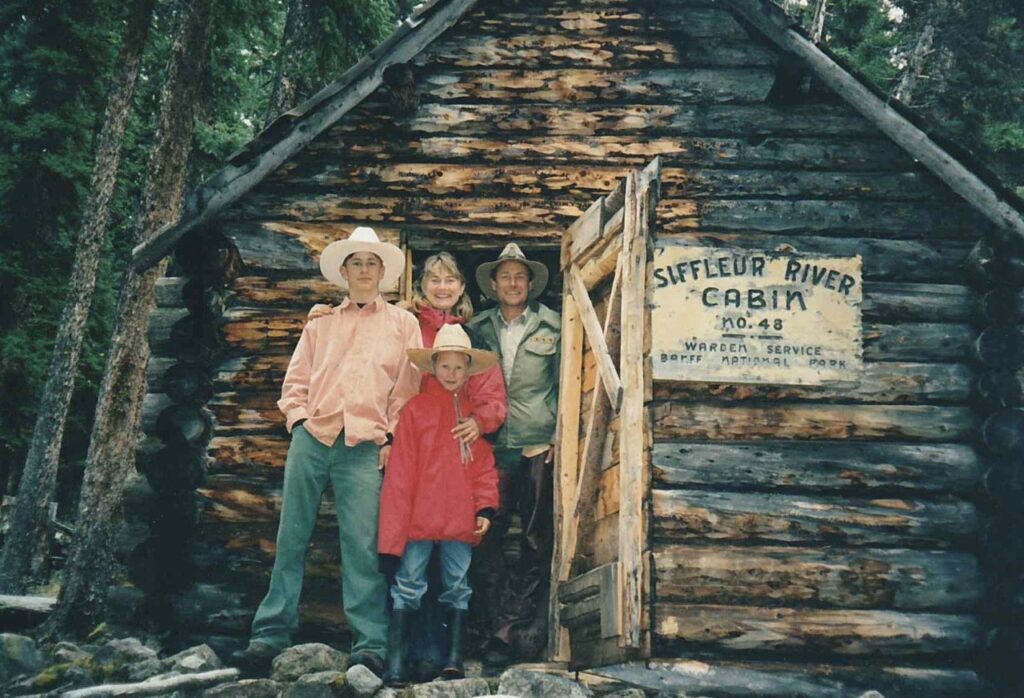
John, Lisa and sons Thomas and Nick at Siffleur River Cabin.
One of my first jobs, my second year with Frank Burstrom and Jimmy Suttill, we were kept on to remove a huge section of the old forestry phone line that was still running through the South Boundary. And I remember I was at Medicine Tent Cabin and the forestry line still worked. So this was my first year, 1978, and I rang Jasper Firehall, and they put me through to Edmonton and I talked to my folks and it worked perfect. It was as clear as day, it was incredible. Two years later, understandably, we had the new radio system which couldn’t get through for days. I remember when Lisa and I, we’d get some weather systems and were on a 24 day shift and it would be three or four days and we would not get through. No one cared, well people cared, but they wouldn’t come looking for you. He’s alright; he’s got Lisa with him, there’s two of them. So, we’d go a number of days without any communication at all.
One time we were out, we came out a day and a half late. We actually lost the trail coming down the Coronel-Grant drainage into the Miette (River). Not too many people travelled there. And Lisa my wife, she was my girlfriend back then, I actually had an old trail map, and I lost the trail, and being stubborn, I looked at this map and those poor horses, I took them through hell. So, it took just about a whole day before we were back on the trail being stupid and stubborn enough, I was going back to my initial spot. Small story short we ended up spending an extra night out at Rink Cabin, when it was still there and get back a day and a half late.
So back to the second year working, Jim Suttill and I and Rob Kaye I think for a little bit, there were three or four of us, we developed a machine to wrap and roll up this wire. We were climbing every insulator. I was climbing probably a couple of hundred trees a day, rolling up this wire and packing it on our backs, and hauling it to different areas along the river where we can fly it out. I’ll tell you, between that and trail crew and being out in the bush, man I was in such good shape. I had muscles everywhere. And I kept it up, because I was out in the backcountry every summer and skiing in the winter. It was sad to see that wire go down, all the years the wardens use to maintain all this wire, and here we were rolling up this old history for one last time, while this new radio system just barely worked at the best of times.
SH: I remember doing radio calls “Beep once if you’re okay, and beep twice if you’re not” And then “Was there a beep?” (Tape 16:35)
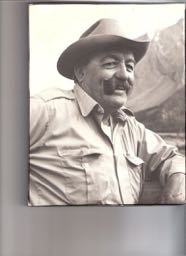
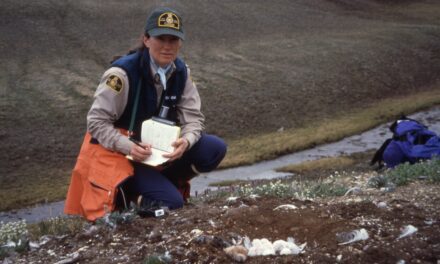
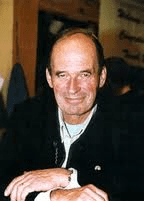
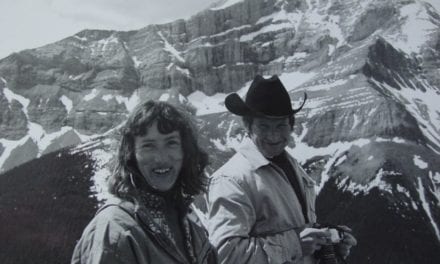
Hi John,
Reading back on your history with Parks Canada Warden Service brought back a couple memories for me as well. I worked in Kootenay National Park in early years 1986-1987 on the gardening and trail crew. Later after attending forestry and wildlife tech school I got a seasonal park warden GT 1 position and spent time working in Lake Louise, Kootenay, Pacific Rim. However, it was the short time spent working with you (trapping bears) on the Banff-Kootenay-Yoho grizzly bear study that prepared me to become a Park Warden. As time would have it, I moved on to other natural resource careers working in the Yukon and BC. You were an influence both professionally and personally as I now near my own retirement. Grateful for these experiences. Thank you for this.
Great interview John. Happy to have met you a couple of times and chased pucks and downed beers at the Warden hockey tourney…. Your thoughts , stories and recollections and those of many others bring back so many good memories of an era many of us were so fortunate to experience , create and enjoy. It was a brotherhood for sure. Not so much these days. . sad but true.. Take care.